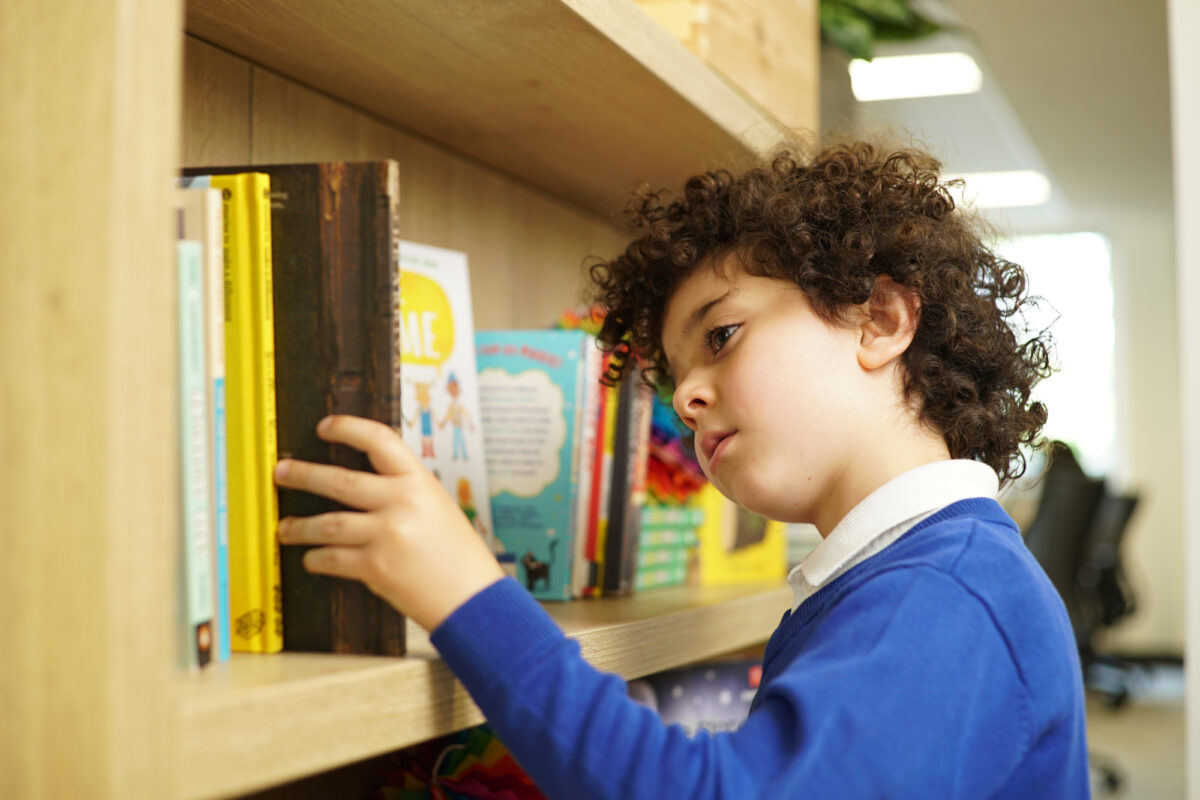Stories that soothe: the link between reading and children’s mental health
This World Mental Health Day, we’re reminded that mental health is a growing issue in the UK, a challenge that many children – especially those from disadvantaged backgrounds – are facing. But there’s hope – and it may be found in a book.

We’ve teamed up with Dr Neena Saha, Research Advisor at MetaMetrics. Her monthly series, the Reading Research Recap, consists of digestible round-ups of the most relevant and must-read research surrounding the reading and learning landscape.
In this blog, Dr Saha dives into the research behind how stories can support children’s wellbeing, from building empathy to boosting confidence.
As reading habits hit an all-time low and screen time replaces story time, we recognise that children’s behaviours are changing: only 1 in 3 children say they enjoy reading for pleasure in their free time and just 1 in 5 read every day (1).
But research from the National Literacy Trust suggests something powerful: children who enjoy reading are three times more likely to have better mental wellbeing than those who don’t. So, what is it about stories that helps?
At Bookmark, we believe every child deserves the chance to discover the joy of reading – and all the benefits that come with it.
Stories build social skills and empathy
Books can be magical. Not only do they transport us to faraway worlds, but they also strengthen the key skills children need for relationship-building and learning.
When children read, they’re practising something important: seeing the world through someone else’s eyes.
Research has found that reading helps children understand others’ thoughts and feelings – this is known as “theory of mind” (2). Connecting with fictional characters helps children to empathise with people in real life (3). These skills help children understand their own emotions and respond with kindness in real life.
Understanding stories and following narratives challenges readers to track characters’ intentions and predict outcomes (4). These social and emotional skills help children build friendships – laying the groundwork for resilience, wellbeing and strong relationships.
Reading can help reduce behavioural challenges
Reading for pleasure doesn’t just increase empathy – it’s also linked with reducing behavioural issues. A 2023 study of over 10,000 young adolescents found that those who started reading for pleasure early in life had better mental wellbeing and fewer signs of depression, stress and other behavioural problems like aggression or rule breaking as they entered adolescence than those children who didn’t read in their early years (5).
Books can be a calming presence in a child’s life, helping them focus, self-regulate and explore their emotions. When reading becomes a regular habit, it offers children a quiet space to reflect and recharge.

Shared reading: creating a comforting routine
Reading for pleasure doesn’t have to be a solo activity. In fact, there are more wellbeing benefits to be had from reading together.
When adults read aloud with children of all ages, it strengthens their bond and creates a safe space for connection. Shared reading routines can lower stress and decrease the risk of social-emotional problems in young children (6).
And it’s not just the children who benefit either. Shared reading between parent and child can increase connection, parental sensitivity and decrease parenting stress (7). In a world full of distractions, reading together offers a moment of calm.
But children aren’t reading enough – what can we do?
Even with all this research showing the positive impact of stories on mental wellbeing, reading for pleasure is on the decline. So, how can we help children re-engage with reading?
Here are a few helpful tips
- Start early: it’s never too soon to share stories – even with babies as young as 6 months
- Make reading a daily habit: try to build at least 20 minutes of reading time into your daily routine. The key is consistency!
- Keep it fun: let children choose books that interest them. Graphic novels, non-fiction and re-reading favourites count! Ask your children fun questions about what they’re reading to engage them with their stories
- Limit screen time: encourage more time with books by gently setting boundaries around phones and devices
- Read aloud, at any age: even older children love being read to! It can be comforting, bonding and joyful
This World Mental Health Day, we want to celebrate the simple but powerful act of reading. The research sends a powerful message: opening a book can have massive benefits on children’s mental health.
We would like to thank Dr Neena Saha for lending her expertise to this blog. Check out her monthly series, The Reading Research Recap, where she explores other research topics around reading.
- National Literacy Trust. (2023). Children and young people’s reading engagement.
- Kidd, D. C., & Castano, E. (2013). “Reading literary fiction improves theory of mind.” Science, 342 (6156), 377–380.
- Santi, E., Cebula, K., and McGeown, S. (2025) Reading and Empathy: Qualitative insights into adolescents' experiences with fiction books. Literacy, 59: 304–313; Van Der Kleij, S. W., Apperly, I., Shapiro, L. R., Ricketts, J. and Devine, R. T. (2022) Reading fiction and reading minds in early adolescence: a longitudinal study. Journal of Experimental Child Psychology, 222, 105476
- Mar, R. A., et al. (2006). “Bookworms versus nerds: Exposure to fiction versus nonfiction, divergent associations with social ability, and the simulation of fictional social worlds.” Journal of Research in Personality, 40(5), 694–712.
- Sun Y-J, Sahakian BJ, Langley C, et al. Early-initiated childhood reading for pleasure: associations with better cognitive performance, mental well-being and brain structure in young adolescence. Psychological Medicine. 2024;54(2):359-373.
- Martin, K.J., Beck, A.F., Xu, Y., Szumlas, G.A., Hutton, J.S., Crosh, C.C., Copeland, K.A. (2022) Shared Reading and Risk of Social-Emotional Problems. Pediatrics, 149(1), 1-11.,
- Canfield CF, Miller EB, Shaw DS, Morris P, Alonso A, Mendelsohn AL. Beyond language: Impacts of shared reading on parenting stress and early parent-child relational health. Developmental Psychology, 2020 Jul;56(7):1305-1315.

Find out more about volunteering
Click here



